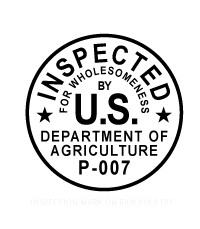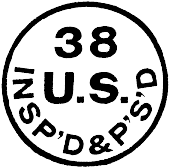Return to Meat, Poultry, and Egg Inspection main menu.
Access to information in an alternative format
There are a few different options for operating a meat or poultry processing business in Minnesota. Each type of processor must meet certain requirements and obtain the appropriate license, permit, and/or inspections prior to operating. If you are planning to purchase or start your own processing business, explore the resources on our website and contact our Licensing Liaison Megan Jansa to learn more.
Continuous Inspection
Continuous inspection means that the business’s process is inspected every day during operations to ensure they are producing safe food. Continuous inspection is required for any business selling their products to other retail outlets such as grocery stores, restaurants, or other food service institutions. In a slaughter processing facility, every animal is inspected to determine that the meat comes from an animal free from signs of disease.
There are two types of continuous inspection:
Federal inspection
Businesses that want to produce and sell their products in other states and/or for export to other countries must be inspected by the United States Department of Agriculture (USDA) Food Safety and Inspection Service (FSIS). These businesses may slaughter their own animals or purchase their products from other USDA FSIS inspected sources and further process these products under continuous inspection. Product produced under continuous inspection at a USDA facility will bear the mark of inspection, as shown below.


Minnesota State "Equal To" USDA Inspection Program or E2 Inspection
Minnesota is one of 29 states currently operating a Meat and Poultry Inspection Program (MPIP), considered at least equal to the federal meat and poultry inspection program. Establishments in Minnesota’s "Equal To" (E2) program can slaughter animals and process products to sell, distribute, and wholesale to any entity within the state of Minnesota. These plants operate under the requirements as set by the Federal Meat Inspection Act or the Poultry Products Inspection Act.
Retailers, restaurants, distributors, schools, food shelves and other entities can buy and serve meat and poultry from Minnesota establishments participating in the E2 program. Products from a Minnesota E2 plant contain a state of Minnesota symbol with the phrase "inspected and passed," and the establishment number.
Currently licensed, permitted E2 plants are listed at Minnesota State "Equal To" Plants. (For a listing of USDA inspected plants, contact the Des Moines District office at 1-800-990-9834 or visit the USDA Meat, Poultry and Egg Product Inspection Directory.)
View a Map of Minnesota Meat Processors.
Custom Exempt Processors
A custom exempt meat processor is a plant that does not require continuous inspection because it only processes meat for the owner of the animal. The meat, poultry, or wild game cannot be sold and can only be consumed by the owner, the owner’s immediate family, and non-paying guests. Custom processed meat must be identified “NOT FOR SALE." Businesses that operate under this exemption are inspected by the state inspection programs or by the USDA FSIS on a regular basis. However, inspections of these operations are conducted less frequently than those of operations under continuous inspection. For more information, go to Custom Exempt Meat Processing.
Wild Game Processing
Because wild game products can only be processed and returned to the owner of the animal (in this case, the hunter or trapper), wild game processing operations are considered custom exempt meat processors. For more information, go to Wild Game Processing.
Retail Exempt Processors
These businesses buy meat and poultry products from approved inspected sources (i.e., federal or state inspected) and then sell these products at retail in their facility. Retail sales are sales to the final consumer. These operations are inspected by state food inspection programs and must meet their state’s regulations for producing food.
Sales to Hotels, Restaurants, and Similar Institutions
Under the Federal Meat Inspection Act and the Poultry Products Inspection Act, sales to hotels, restaurants, and similar institutions disqualify a retail store from exemption if the retail product sales of amenable products exceed either of two maximum limits: 25% of the dollar value of the total retail product sales or the calendar year retail dollar limitation (adjusted annually). Learn more about the Retail Exemptions Adjusted Dollar Limitations.
License and Permit Requirements for Meat Processors
For meat and poultry processors in Minnesota, licenses are renewed annually, whereas permits are obtained one time prior to the start of operations. Before a license or permit is issued, a new business must meet certain facility and operation requirements. Filling out an application form for a license and/or permit is the last step in a review and approval process that may take weeks or months to complete. This includes submitting documentation such as a letter of intent, a Hazard Analysis and Critical Control Point plan, sanitation standard operating procedures, proper labels, a recall plan, and an effective pest control plan. An onsite review of the facility is also required before a grant of inspection can be issued.
The costs associated with obtaining a food handler license and inspection permit are as follows (current as of August 1, 2025):
- License fee based on a sliding scale according to expected gross sales or services, with the initial license fee pro-rated by start date. Meat and Poultry Inspection Program personnel work with new businesses to help them calculate their initial fee. On the low end, this fee may be less than $100. For larger scale operations with expected gross annual sales above one million dollars, the fee may exceed $1,000.
- One-time $50 application fee charged for new license holders to account for additional MDA staff time required to get new operations up and running (does not apply to custom exempt food handlers).
- A 5% surcharge (minimum $5) applied on all new license and renewal applications; this surcharge supports the modernization of the MDA's technology systems to provide more efficient application processing and better customer service.
The below table indicates which license and permit a processor must obtain. Note that this does not apply to processors who sell products across state lines. Processing meat and poultry for sales across state lines requires inspection by the USDA, and licensing would be handled by the MDA Food and Feed Safety Division.
| Type of Operation | License Required | License Period | Permit Required |
| Wholesale only | Food Handler - Equal To Meat & Poultry Plant | Jan. 1 - Dec. 31 | Equal To Grant of Inspection |
| Retail only, or both retail and wholesale | Food Handler | Jan. 1 - Dec. 31 | Equal To Grant of Inspection |
| No product sales - exclusively custom processing | Custom Exempt Food Handler | July 1 - June 30 | Custom Processing Permit |
| Retail, wholesale, and custom processing | Food Handler | Jan. 1 - Dec. 31 | Equal To Grant of Inspection and Custom Processing Permit |
Access to Information in an Alternative Format
The Minnesota Department of Agriculture strives to ensure that reasonable steps are taken to provide meaningful access and an equal opportunity to participate in services, activities and programs to individuals whose first language is not English or who need an accommodation for a disability.
Translation services are available if individuals need assistance to access services, activities and programs; key documents and resources may be translated upon request.
For assistance in obtaining access to services or to arrange for translation services, please contact the Dairy and Meat Inspection Division at 651-201-6300.
The Minnesota Department of Agriculture is an equal opportunity employer and provider.

